Politics
/ArcaMax

Costco forgoes sale of abortion pill, emboldening religious groups
Costco Wholesale Corp. has decided not to dispense the abortion pill mifepristone at its more than 500 pharmacy locations, a decision hailed by a group of faith-based activists who urged the retailer to avoid selling the drug.
Costco said in a statement that it hasn’t seen consumer demand for the pill, and had no comment on whether the ...Read more
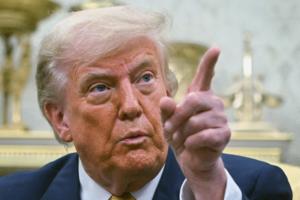
Trump predicts 25% chance of 'bad meeting' with Putin in Alaska on Ukraine
President Trump Thursday said he has high hopes of making progress to a Ukraine peace deal at a Friday afternoon summit with Russia’s Vladimir Putin in Alaska, but admitted there is a 1 in 4 chance of a “bad meeting.”
“There is a 25% chance that this meeting will not be a successful meeting, in which case I’ll return to run the ...Read more
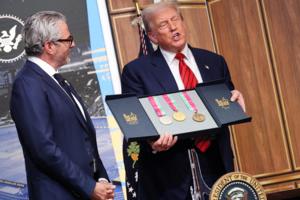
Homeless people in detention camps? Fears grow about Trump and the Olympics
Local officials and advocates for the homeless are fearful that President Trump will take draconian action against homeless people, including pushing them into detention camps, when Los Angeles hosts the Olympic Games in 2028.
In recent weeks, Trump has appointed himself head of an Olympics task force and has seized control of local policing in...Read more

Commentary: Executive order to institutionalize homeless people defies data
President Donald Trump’s campaign against homeless people is not limited to the District of Columbia. On July 24, Trump issued an executive order titled “Ending Crime and Disorder on America’s Streets.” How exactly is that to be accomplished?
“Shifting homeless individuals into long-term institutional settings for humane treatment ...Read more
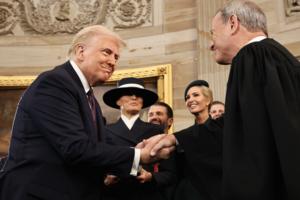
Commentary: Trump isn't the main villain in Texas' gerrymander scheme
If you want someone to blame for the recent crisis caused by President Trump’s rush to force a gerrymander of Texas’ congressional districts, and the harried responses from governors in California, Illinois and New York, you can start with the Supreme Court.
In 2019, in Rucho vs. Common Cause, the group held, 5 to 4, that challenges to ...Read more
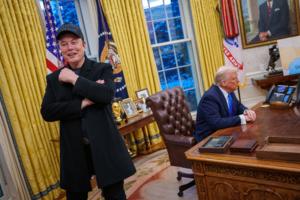
Trump signs order to ease space industry regulations in Musk win
President Donald Trump signed an executive order Wednesday to ease regulations for the commercial space industry, including steps to speed the licensing process for rocket launches in a win for the growing sector and onetime ally Elon Musk’s SpaceX.
The executive order directs the secretary of Transportation to review regulatory requirements ...Read more
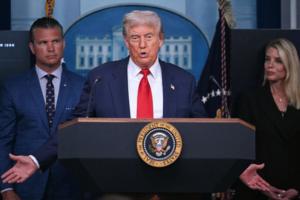
Trump willing to meet with Democrats before shutdown deadline
WASHINGTON — President Donald Trump on Wednesday said he would meet with House and Senate Democratic leaders ahead of a government funding deadline but cast doubt on a deal to avoid a federal shutdown.
Trump has not met with House Minority Leader Hakeem Jeffries or Senate Minority Leader Charles E. Schumer, both of New York, since returning ...Read more
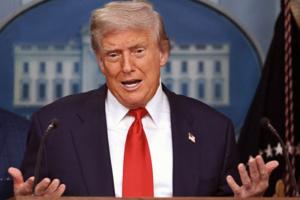
Court limits funding lawsuits to GAO
WASHINGTON — A federal appeals court said Wednesday that only the Government Accountability Office can sue over the Trump administration’s funding freezes — not people impacted by the funding cuts.
The 2-1 decision from the U.S. Court of Appeals for the District of Columbia Circuit undid a lower court ruling requiring the Trump ...Read more

Trump rewrites Sylvester Stallone's 'Rocky' history at Kennedy Center event
President Donald Trump rewrote the script on how Sylvester Stallone came to play “Rocky” when he told a Kennedy Center crowd on Wednesday that film executives insisted the aspiring actor play the title character in the 1976 film.
For nearly 50 years, its been known that Stallone campaigned to play Rocky Balboa as producers did everything in...Read more
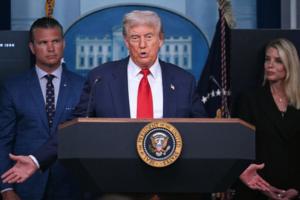
Trump willing to meet with Democrats before shutdown deadline
WASHINGTON — President Donald Trump on Wednesday said he would meet with House and Senate Democratic leaders ahead of a government funding deadline but cast doubt on a deal to avoid a federal shutdown.
Trump has not met with House Minority Leader Hakeem Jeffries or Senate Minority Leader Charles E. Schumer, both of New York, since returning ...Read more
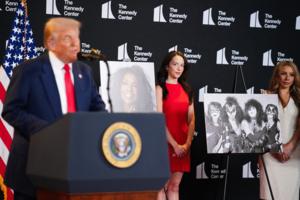
Trump says he'll host Kennedy Center honors for Stallone, Kiss
WASHINGTON — President Donald Trump announced he would host the Kennedy Center Honors, which will go to actor Sylvester Stallone, rock band Kiss and singer Gloria Gaynor among others during the first year of his chairmanship of Washington, DC’s main performing arts center.
The president also vowed to “fully renovate” the John F. ...Read more

Court lets Trump block billions of dollars in foreign aid
WASHINGTON — The Trump administration can cut billions of dollars in foreign assistance funds approved by Congress for this year, a U.S. appeals court ruled.
In a 2-1 decision on Wednesday, the appellate panel reversed a Washington federal judge who found that U.S. officials were violating the Constitution’s separation of powers principles ...Read more
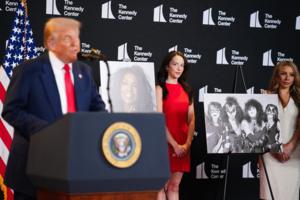
Trump picks Sylvester Stallone, Kiss for Kennedy Center Honors, plans to host ceremony
Bucking tradition once again, President Donald Trump on Wednesday announced his picks for Kennedy Center Honors and said he will host the ceremony himself — a first for any president. Actor and filmmaker Sylvester Stallone, glam rock band Kiss, disco singer Gloria Gaynor, country music star George Strait and English actor and comedian Michael ...Read more
Trump's DC homeless crackdown raises stakes for Atlanta's World Cup plans
ATLANTA — When Atlanta revealed its ambitious plans to clear homeless camps downtown ahead of the FIFA World Cup next summer, city officials said their goal was to house people, not throw them in jail.
That housing-first approach appears at odds with President Donald Trump, who on Monday launched a federal takeover of the Washington, D.C., ...Read more

Why a Connecticut group provides 'rush hour resistance' to connect with voters in protest of Trump's policies
HARTFORD, Conn. — If you travel along Interstate 91 during rush hour in Hartford on any given weekday you may notice a smiling face waving to you above on the pedestrian overpass bridge along with American flags, signs and messages to alert motorists below that “things are not normal.”
The Hartford Visibility Brigade, a group of area ...Read more
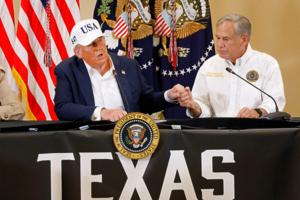
Editorial: Count 'em all -- Trump has no authority to muck with 2030 Census Bureau count
Not caring about the U.S. Constitution is a regular refrain for President Donald Trump, who now wants to exclude undocumented people from the 2030 census count — a nonstarter as much else is in this bizarro world we now inhabit, promulgated via a screed on his Truth Social platform — is both a terrible idea and certainly a rehash.
Trump ...Read more
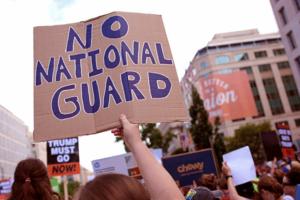
Commentary: Of course Trump wants to flex on DC. Where are the Democrats to stop him?
Remember “I alone can fix it”? President Donald Trump, who made that laughable statement in his 2016 convention acceptance speech, is now testing the theory in Washington.
Trump and his party have been threatening a D.C. takeover for years and made it part of the Republican platform last year. But it was all just empty talk and random ...Read more
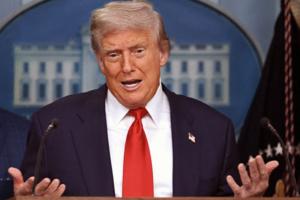
Editorial: One-man rule -- Trump's DC police takeover another authoritarian step
President Donald Trump using an obscure emergency provision in federal law pertaining to Washington, D.C. to attempt to take full control over the capital’s local police force is not responding to any “emergency,” but just a pure power grab.
Coming a day after he’d sent federal agents to patrol the streets and moved to deploy the ...Read more
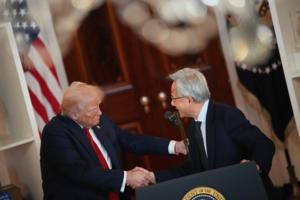
Trump's unusual deal with Nvidia and AMD sparks concerns, legal questions
President Trump struck an unusual deal with Nvidia and Advanced Micro Devices that allows the companies to sell certain chips to China in exchange for giving the U.S. government a 15% cut of those sales.
But the unprecedented agreement also has raised concerns from politicians and legal experts over whether the deal is legal and would pose a ...Read more
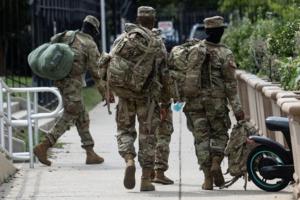
Do Americans back Trump's takeover of DC police? Here's what a new poll found
Americans are divided over President Donald Trump’s decision to take control of local law enforcement and activate the military in the nation’s capital, according to new polling.
On Aug. 11, Trump announced that his administration would federalize the Metropolitan Police Department under the Home Rule Act, a 1973 law that grants the ...Read more
Popular Stories
- Trump willing to meet with Democrats before shutdown deadline
- Commentary: Executive order to institutionalize homeless people defies data
- Commentary: Trump isn't the main villain in Texas' gerrymander scheme
- Why a Connecticut group provides 'rush hour resistance' to connect with voters in protest of Trump's policies
- Trump signs order to ease space industry regulations in Musk win























































